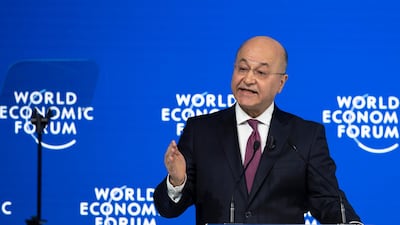Iraq has often been on the agenda in Davos, and various officials from Iraq or working on it have attended over the past 50 years of the Annual Meetings. But for the first time ever, an Iraqi president has addressed the Annual Meeting of the World Economic Forum.
Barham Salih had attended the forum many times before, but returned to Davos this year as his country’s head of state. Speaking from the podium of the main plenary hall, Mr Salih addressed the challenges facing Iraq, especially challenges to its sovereignty in light of the exchange of US and Iranian fire on its turf, while calling the killing of over 600 protesters since October “devastating and shameful”. And yet he did not directly name those responsible for the killing, referencing them as “unlawful elements”.
While it may be easy to criticise him for not naming and shaming the rogue elements in the Iraqi security forces and militias, Mr Salih is walking an incredibly fine line at a volatile time. Only a few weeks ago, he refused to endorse the Iranian-backed Islamist Shia candidate for PM, and just this week he was threatened with death if he met with the US president.
Mr Salih’s attendance at Davos was in question until the last moment, as rumours swirled of the possibility of him naming a Prime Minister and pressure ramped up on him, but he continued with his plans.
Despite militia threats to his own safety, Mr Salih met with his counterpart Donald Trump and spoke of the “debt” Iraq has towards the international coalition, led by the US.
Yet he also made a point of stressing the importance of his country’s sovereignty in his public remarks at the start of that meeting. A meeting between the two was a vital bridge in trying to calm tensions down, while the issue of American troop presence becomes more contentious in Iraq.
Mr Salih tried to maintain his tightrope balancing act in his speech and in his public remarks in Davos, stressing Iraqi sovereignty and the need for ties with both the US and Iran. Behind closed doors, the message is similar, but the tone is markedly more concerned.
Unexpectedly, both Shiite clerics Moqtada AlSadr and Ammar AlHakim issued statements Wednesday night lauding Mr Salih’s speech and supporting it. The Davos gamble may bear some fruits, despite anger from other Iran-backed politicians and some militias calling for protests at Baghdad airport upon his return.
In the front row of the Congress Hall as Mr Barham spoke was UN Special Representative to Iraq Jeanine Plasschaert. She and several leaders of humanitarian agencies have spoken of their continued concern about developments in Iraq and yet have to continue to appear “neutral” and not call out the criminals behind the murder of over 600 protestors and wounding of over 24,000 Iraqis since the start of the protests last October.
Diplomacy is both hard and frustrating, and a spiralling of violence is very possible. That is the tone that those working on Iraq expressed in Davos.
But the spirit of the protesters and the stubborn Iraqi nationalism they have shown has been noted. At an incredibly high cost, their voice has reached Davos and forced itself into considerations of what comes next in Iraq.


